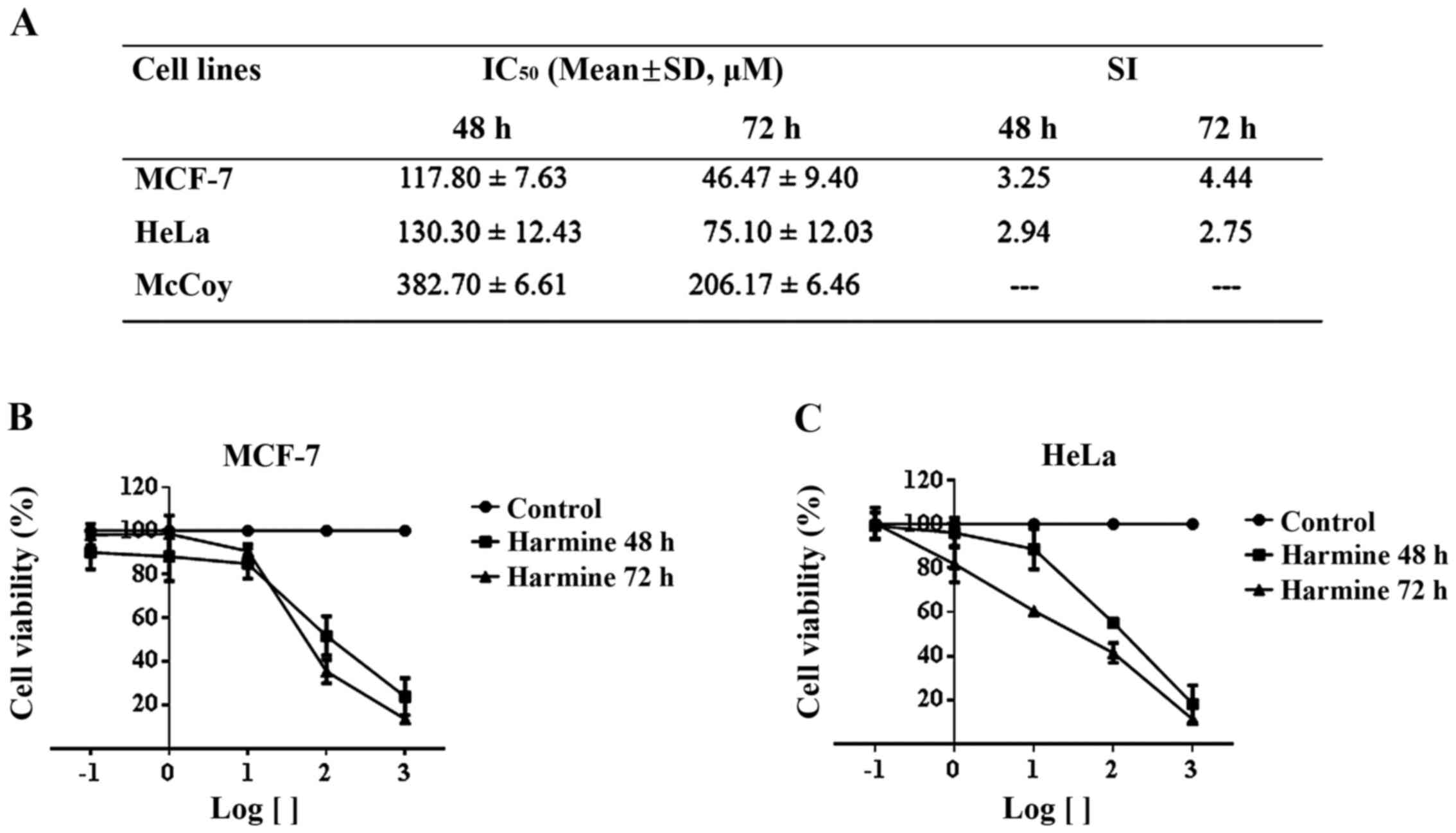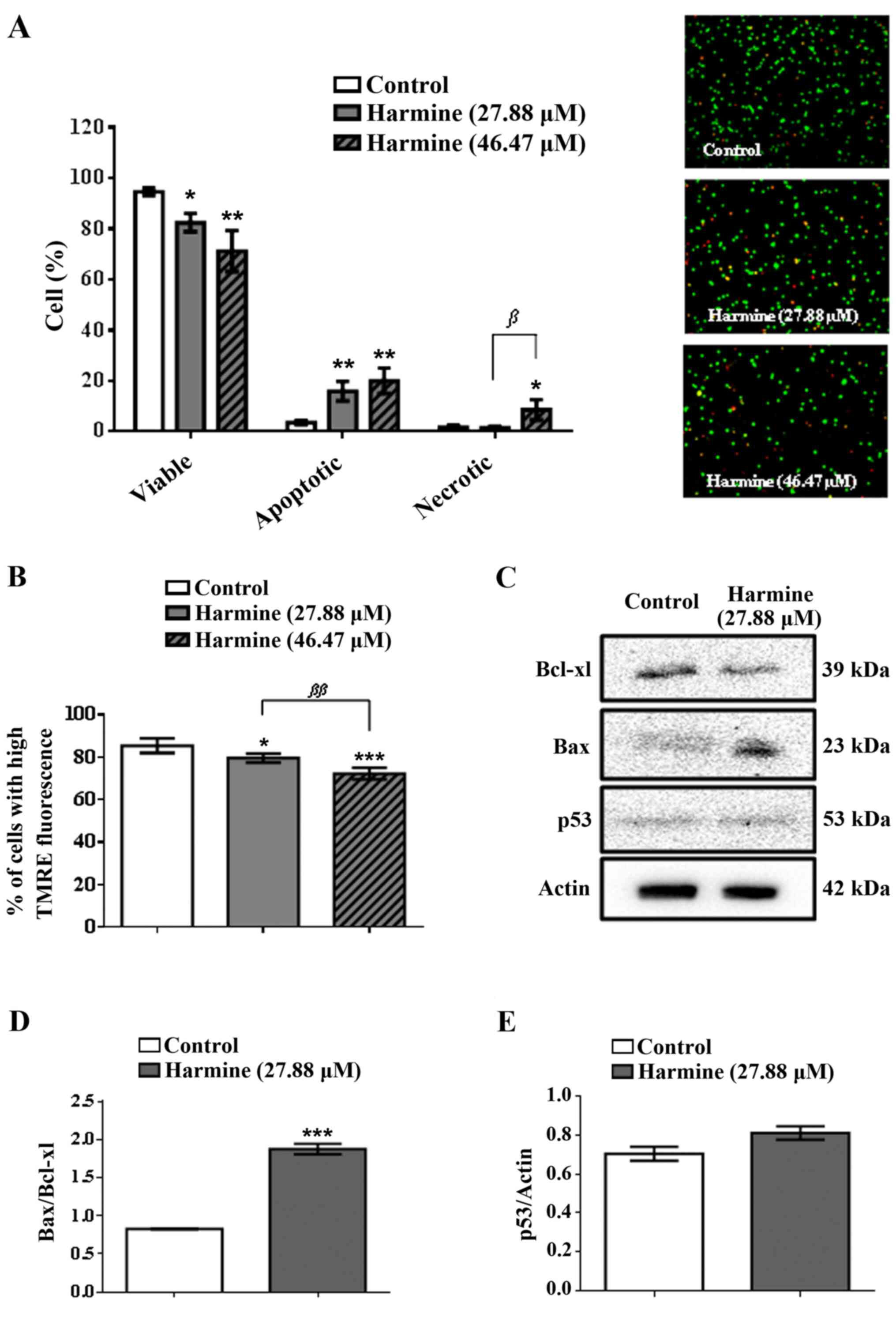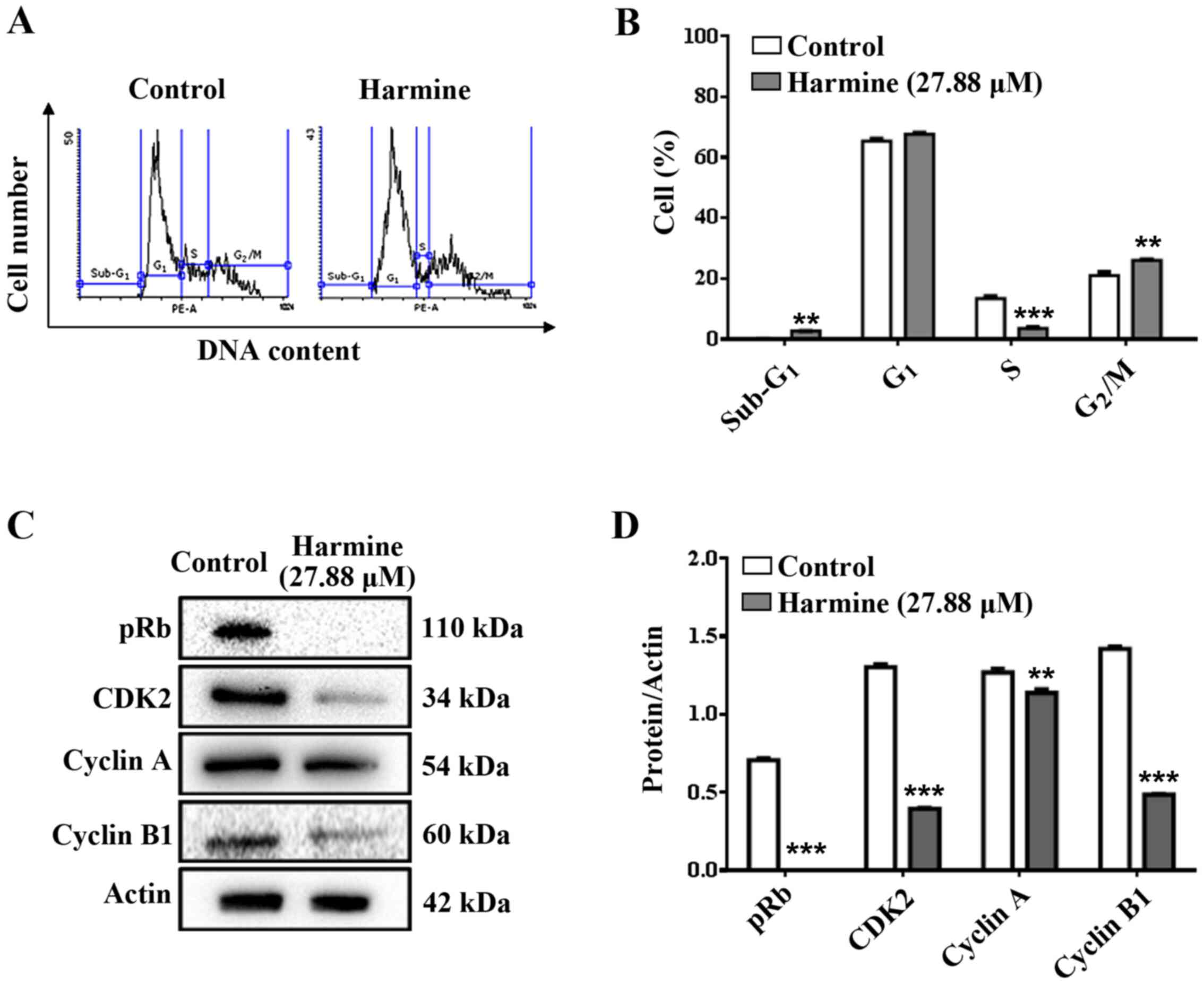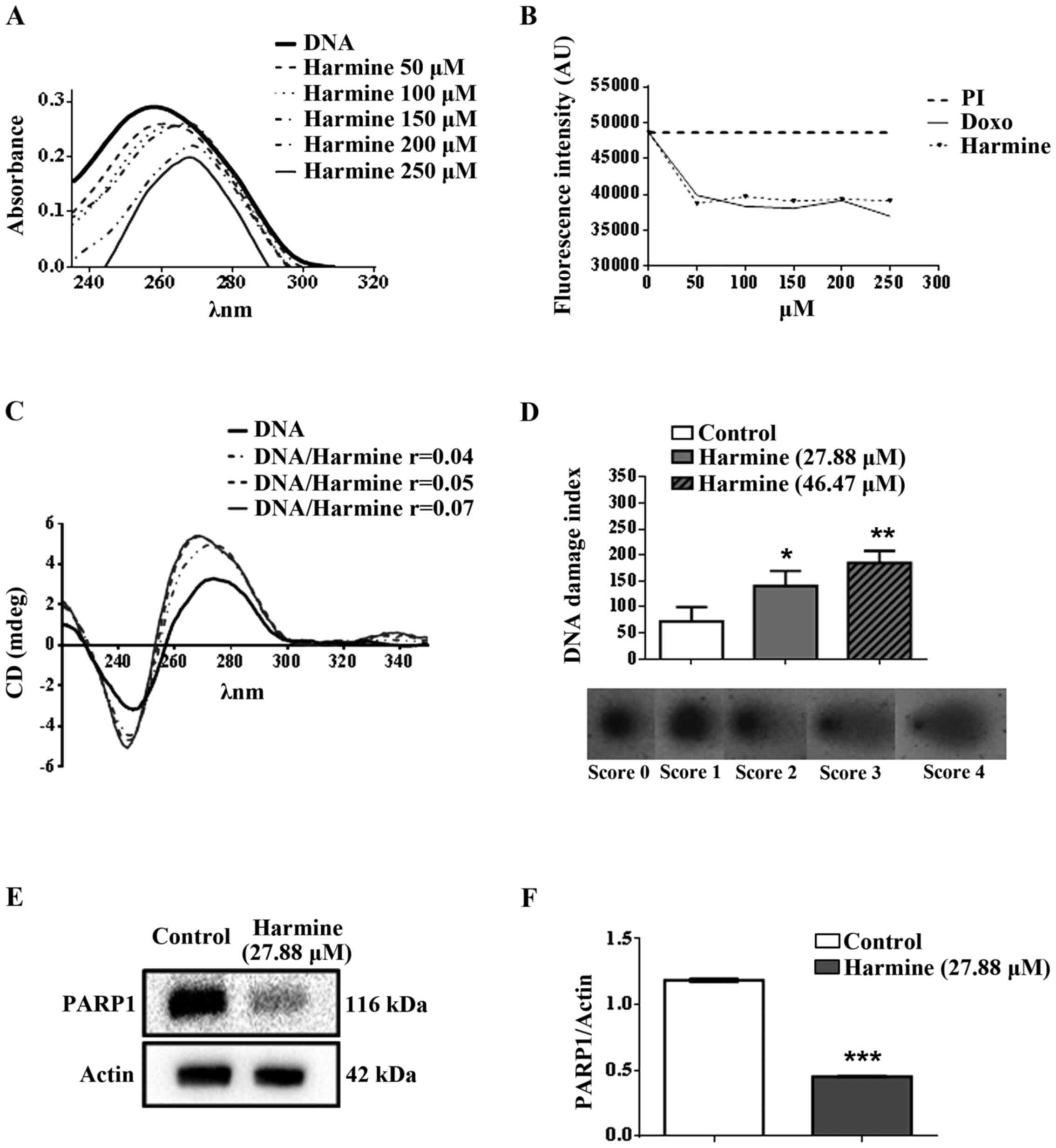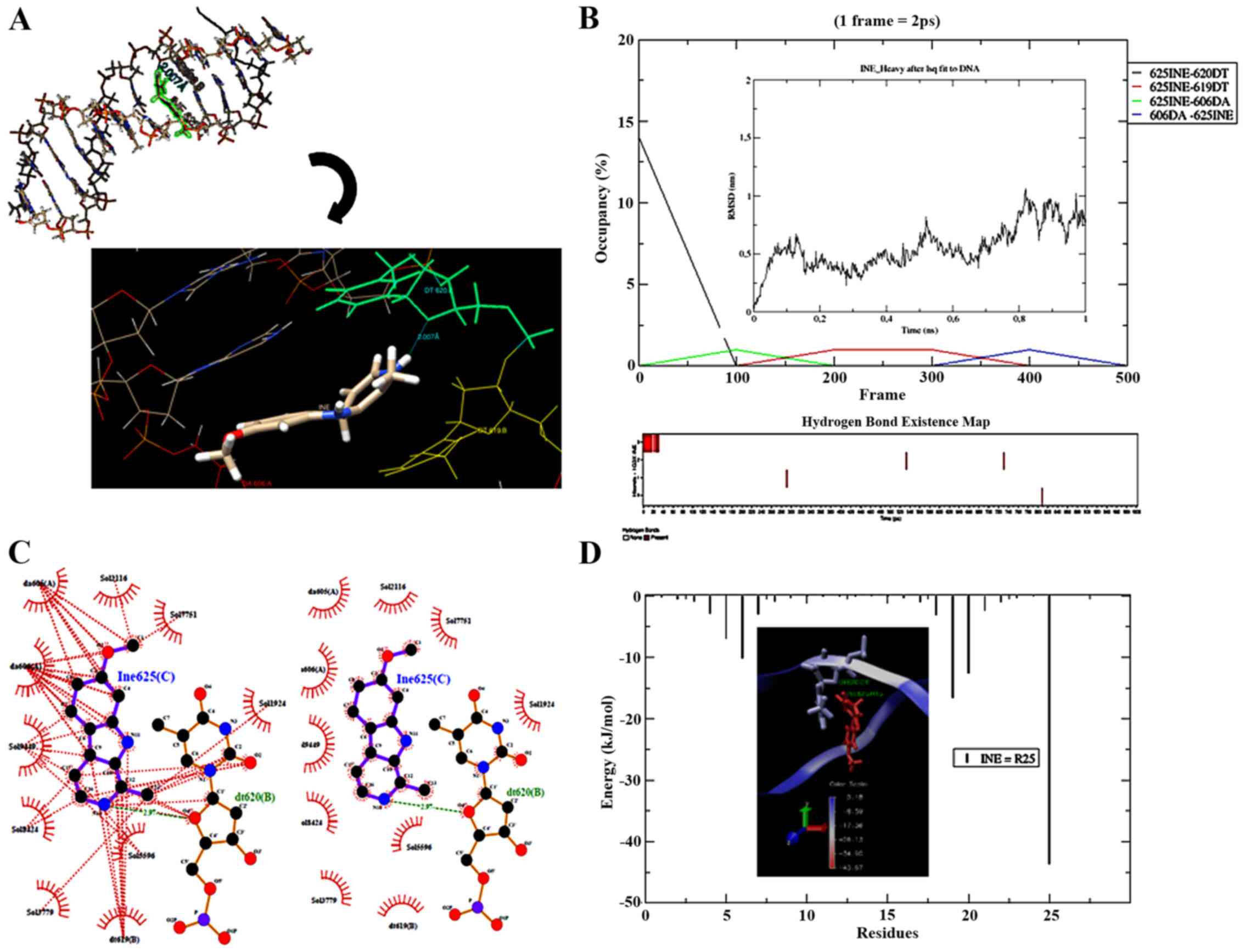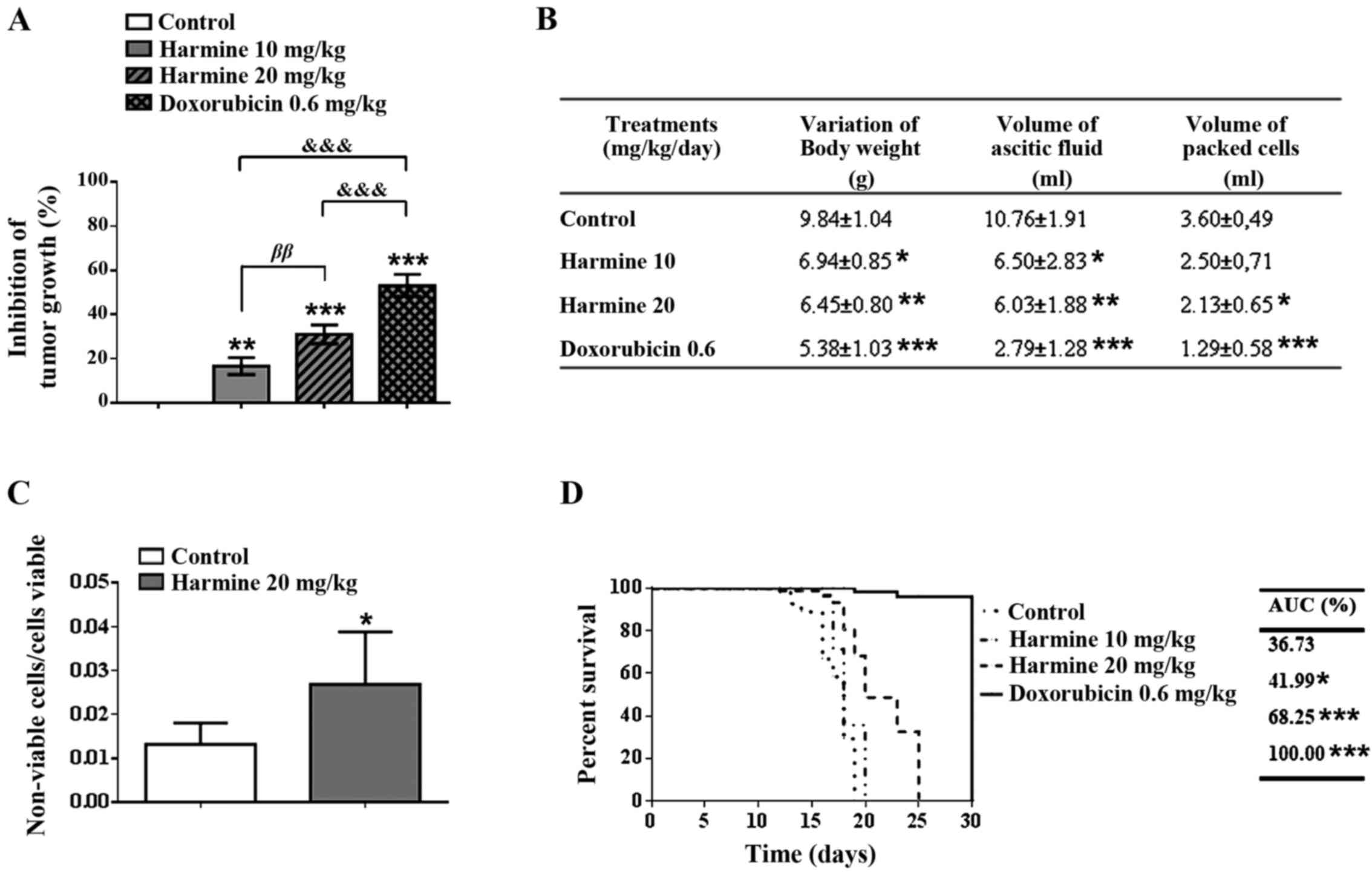|
1
|
World Health Organization (WHO): Cancer.
WHO, Geneva, 2018. https://www.who.int/cancer/en/.
Accessed September 12, 2018.
|
|
2
|
Ali R, Mirza Z, Ashraf GMD, Kamal MA,
Ansari SA, Damanhouri GA, Abuzenadah AM, Chaudhary AG and Sheikh
IA: New anticancer agents: Recent developments in tumor therapy.
Anticancer Res. 32:2999–3005. 2012.PubMed/NCBI
|
|
3
|
Patel K, Gadewar M, Tripathi R, Prasad SK
and Patel DK: A review on medicinal importance, pharmacological
activity and bioanalytical aspects of beta-carboline alkaloid
‘Harmine’. Asian Pac J Trop Biomed. 2:660–664. 2012.PubMed/NCBI View Article : Google Scholar
|
|
4
|
Piechowska P, Zawirska-Wojtasiak R and
Mildner-Szkudlarz S: Bioactive β-carbolines in food: a review.
Nutrients. 11:1–10. 2019.PubMed/NCBI View Article : Google Scholar
|
|
5
|
Tsuchiya H, Shimizu H and Iinuma M:
Beta-carboline alkaloids in crude drugs. Chem Pharm Bull (Tokyo).
47:440–443. 1999.
|
|
6
|
Li S, Teng L, Liu W, Cheng X, Jianga B,
Wang Z and Wang CH: Pharmacokinetic study of harmane and its 10
metabolites in rat after intravenous and oral administration by
UPLC-ESI-MS/MS. Pharm Biol. 54:1768–1781. 2016.PubMed/NCBI View Article : Google Scholar
|
|
7
|
Pierson JT, Dietzgen RG, Shaw PN,
Roberts-Thomson SJ, Monteith GR and Gidley MJ: Major Australian
tropical fruits biodiversity: Bioactive compounds and their
bioactivities. Mol Nutr Food Res. 56:357–387. 2012.PubMed/NCBI View Article : Google Scholar
|
|
8
|
Lam SK and Ng TB: Passiflin, a novel
dimeric antifungal protein from seeds of the passion fruit.
Phytomedicine. 16:172–180. 2009.PubMed/NCBI View Article : Google Scholar
|
|
9
|
Ingale AG and Hivrale AU: Pharmacological
studies of Passiflora sp. and their bioactive compounds. Afr
J Plant Sci. 4:417–426. 2010.
|
|
10
|
Zhang P, Huang CR, Wang W, Zhang XK, Chen
JJ, Wang JJ, Lin C and Jiang JW: Harmine hydrochloride triggers G2
phase arrest and apoptosis in MGC-803 cells and SMMC-7721 cells by
upregulating p21, activating caspase-8/Bid, and downregulating
ERK/Bad pathway. Phytother Res. 30:31–40. 2016.PubMed/NCBI View Article : Google Scholar
|
|
11
|
Sobhani AM, Ebrahimi SA and Mahmoudian M:
An in vitro evaluation of human DNA topoisomerase I inhibition by
Peganum harmala L. seeds extract and its β-carboline
alkaloids. J Pharm Pharm Sci. 5:19–23. 2002.PubMed/NCBI
|
|
12
|
Liu J, Li Q, Liu Z, Lin L, Zhang X, Cao M
and Jiang J: Harmine induces cell cycle arrest and mitochondrial
pathway-mediated cellular apoptosis in SW620 cells via inhibition
of the Akt and ERK signaling pathways. Oncol Rep. 35:3363–3370.
2016.PubMed/NCBI View Article : Google Scholar
|
|
13
|
Hamsa TP and Kuttan G: Harmine activates
intrinsic and extrinsic pathways of apoptosis in B16F-10 melanoma.
Chin Med. 6(11)2011.PubMed/NCBI View Article : Google Scholar
|
|
14
|
Mosmann T: Rapid colorimetric assay for
cellular growth and survival: Application to proliferation and
cytotoxicity assays. J Immunol Methods. 65:55–63. 1983.PubMed/NCBI View Article : Google Scholar
|
|
15
|
Koch A, Tamez P, Pezzuto J and Soejarto D:
Evaluation of plants used for antimalarial treatment by the Maasai
of Kenya. J Ethnopharmacol. 101:95–99. 2005.PubMed/NCBI View Article : Google Scholar
|
|
16
|
McGahon AJ, Martin SJ, Bissonnette RP,
Mahboubi A, Shi Y, Mogil RJ, Nishioka WK and Green DR: The end of
the (cell) line: Methods for the study of apoptosis in vitro.
Methods Cell Biol. 46:153–185. 1995.PubMed/NCBI View Article : Google Scholar
|
|
17
|
O'Reilly CM, Fogarty KE, Drummond RM, Tuft
RA and Walsh JV Jr: Quantitative analysis of spontaneous
mitochondrial depolarizations. Biophys J. 85:3350–3357.
2003.PubMed/NCBI View Article : Google Scholar
|
|
18
|
Navarro M, Cisneros-Fajardo EJ,
Fernandez-Mestre M, Arrieche D and Marchan E: Synthesis,
characterization, DNA binding study and biological activity against
Leishmania mexicana of [Cu(dppz)2]BF4. J Inorg Biochem. 97:364–369.
2003.PubMed/NCBI View Article : Google Scholar
|
|
19
|
Da Silveira VC, Benezra H, Luz JS, Georg
RC, Oliveira CC and Ferreira AMDC: Binding of oxindole-Schiff base
copper (II) complexes to DNA and its modulation by the ligand. J
Inorg Biochem. 105:1692–1703. 2011.PubMed/NCBI View Article : Google Scholar
|
|
20
|
Bertoldo JB, Razzera G, Vernal J, Brod
FCA, Arisi ACM and Terenzi H: Structural stability of
Staphylococcus xylosus lipase is modulated by Zn(2+) ions. Biochim
Biophys Acta. 1814:1120–1126. 2011.PubMed/NCBI View Article : Google Scholar
|
|
21
|
Malinina L, Soler-López M, Aymamí J and
Subirana JÁ: Intercalation of an acridine-peptide drug in an AA/TT
base step in the crystal structure of [d(CGCGAATTCGCG)](2) with six
duplexes and seven Mg(2+) ions in the asymmetric unit.
Biochemistry. 41:9341–9348. 2002.PubMed/NCBI View Article : Google Scholar
|
|
22
|
Pettersen EF, Goddard TD, Huang CC, Couch
GS, Greenblatt DM, Meng EC and Ferrin TE and Ferrin TE: UCSF
Chimera - a visualization system for exploratory research and
analysis. J Comput Chem. 25:1605–1612. 2004.PubMed/NCBI View Article : Google Scholar
|
|
23
|
Hornak V, Abel R, Okur A, Strockbine B,
Roitberg A and Simmerling C: Comparison of multiple AMBER force
fields and development of improved protein backbone parameters.
Proteins. 65:712–725. 2006.PubMed/NCBI View Article : Google Scholar
|
|
24
|
Sousa da Silva AW and Vranken WF: ACPYPE -
AnteChamber PYthon Parser interfacE. BMC Res Notes.
5(367)2012.PubMed/NCBI View Article : Google Scholar
|
|
25
|
Wang J, Wang W, Kollman PA and Case DA:
Automatic atom type and bond type perception in molecular
mechanical calculations. J Mol Graph Model. 25:247–260.
2006.PubMed/NCBI View Article : Google Scholar
|
|
26
|
Forli S, Huey R, Pique ME, Sanner MF,
Goodsell DS and Olson AJ and Olson AJ: Computational protein-ligand
docking and virtual drug screening with the AutoDock suite. Nat
Protoc. 11:905–919. 2016.PubMed/NCBI View Article : Google Scholar
|
|
27
|
Trott O and Olson AJ: AutoDock Vina:
Improving the speed and accuracy of docking with a new scoring
function, efficient optimization, and multithreading. J Comput
Chem. 31:455–461. 2010.PubMed/NCBI View Article : Google Scholar
|
|
28
|
Schrödinger LCC: The PyMOL Molecular
Graphics System, Version 1.8. Schrödinger. LCC, New York, NY,
2015.
|
|
29
|
Laskowski RA and Swindells MB: LigPlot+:
Multiple ligand-protein interaction diagrams for drug discovery. J
Chem Inf Model. 51:2778–2786. 2011.PubMed/NCBI View Article : Google Scholar
|
|
30
|
Hanwell MD, Curtis DE, Lonie DC,
Vandermeersch T, Zurek E and Hutchison GR: Avogadro: An advanced
semantic chemical editor, visualization, and analysis platform. J
Cheminform. 4(17)2012.PubMed/NCBI View Article : Google Scholar
|
|
31
|
Van Der Spoel D, Lindahl E, Hess B,
Groenhof G, Mark AE and Berendsen HJC: GROMACS: Fast, Flexible, and
Free. J Comput Chem. 26:1701–1718. 2005.PubMed/NCBI View Article : Google Scholar
|
|
32
|
Abraham M, Hess B, Van Der Spoel D,
Lindahl E and the GROMACS development team: GROMACS User Manual
version 4, 2018. uriwww.gromacs.orghttps://www.gromacs.org.
|
|
33
|
Jorgensen WL, Chandrasekhar J, Madura JD,
Impey RW and Klein ML: Comparison of simple potential functions for
simulating liquid water. J Chem Phys. 79:926–935. 1983.
|
|
34
|
Kumari R, Kumar R and Lynn A: Open Source
Drug Discovery Consortium: g_mmpbsa - a GROMACS tool for
high-throughput MM-PBSA calculations. J Chem Inf Model.
54:1951–1962. 2014.PubMed/NCBI View Article : Google Scholar
|
|
35
|
Hsin J, Arkhipov A, Yin Y, Stone JE and
Schulten K: Using VMD: an introductory tutorial. Curr Protoc
Bioinformatics: CHAPTER: Unit–5.7, 2008.
|
|
36
|
Verlet L: Computer ‘Experiments’ on
Classical Fluids. I. Thermodynamical Properties of Lennard-Jones
Molecules. Phys Rev. 159:98–103. 1967.
|
|
37
|
Lemkul JA, Allen WJ and Bevan DR:
Practical considerations for building GROMOS-compatible
small-molecule topologies. J Chem Inf Model. 50:2221–2235.
2010.PubMed/NCBI View Article : Google Scholar
|
|
38
|
Singh NP, McCoy MT, Tice RR and Schneider
EL: A simple technique for quantitation of low levels of DNA damage
in individual cells. Exp Cell Res. 175:184–191. 1988.PubMed/NCBI View Article : Google Scholar
|
|
39
|
Ross GM, McMillan TJ, Wilcox P and Collins
AR: The single cell microgel electrophoresis assay (comet assay):
Technical aspects and applications. Report on the 5th LH Gray Trust
Workshop, Institute of Cancer Research, 1994. Mutat Res. 337:57–60.
1995.PubMed/NCBI View Article : Google Scholar
|
|
40
|
Laemmli UK: Cleavage of structural
proteins during the assembly of the head of bacteriophage T4.
Nature. 227:680–685. 1970.PubMed/NCBI View Article : Google Scholar
|
|
41
|
Kviecinski MR, Benelli P, Felipe KB,
Correia JFG, Pich CT, Ferreira SRS and Pedrosa RC: SFE from
Bidens pilosa Linné to obtain extracts rich in cytotoxic
polyacetilenes with antitumor activity. J Supercrit Fluids.
56:243–248. 2011.
|
|
42
|
Hossain MA, Kim D, Jang JY, Kang YJ, Yoon
JH, Moon JK, Chung HY, Kim GY, Choi YH, Copple BL and Kim ND:
Aspirin enhances doxorubicin-induced apoptosis and reduces tumor
growth in human hepatocellular carcinoma cells in vitro and
in vivo. Int J Oncol. 40:1636–1642. 2012.PubMed/NCBI View Article : Google Scholar
|
|
43
|
Felipe KB, Kviecinski MR, Ourique F,
Bücker NF, Farias MS, Castro LSEPW, Grinevicius VMAS, Motta NS,
Correia JFG, Rossi MH and Pedrosa RC: Inhibition of tumor
proliferation associated with cell cycle arrest caused by extract
and fraction from Casearia sylvestris (Salicaceae). J
Ethnopharmacol. 155:1492–1499. 2014.PubMed/NCBI View Article : Google Scholar
|
|
44
|
Kaplan EL and Meier P: Nonparametric
estimation from incomplete observations. J Am Stat Assoc.
53:457–481. 1958.
|
|
45
|
Strober W: Trypan blue exclusion test of
cell viability. Curr Protoc Immunol 3 (Appendix): 3B, 2001.
|
|
46
|
Fox K: Drug-DNA interaction protocols. 2nd
edition. Humana Press, Southampton, 1977.
|
|
47
|
Villanueva PJ, Martinez A, Baca ST,
DeJesus RE, Larragoity M, Contreras L, Gutierrez DA, Varela-Ramirez
A and Aguilera RJ: Pyronaridine exerts potent cytotoxicity on human
breast and hematological cancer cells through induction of
apoptosis. PLoS One. 13(e0206467)2018.PubMed/NCBI View Article : Google Scholar
|
|
48
|
Badisa RB, Darling-Reed SF, Joseph P,
Cooperwood JS, Latinwo LM and Goodman CB: Selective cytotoxic
activities of two novel synthetic drugs on human breast carcinoma
MCF-7 cells. Anticancer Res. 29:2993–2996. 2009.PubMed/NCBI
|
|
49
|
Duchen MR: Contributions of mitochondria
to animal physiology: From homeostatic sensor to calcium signalling
and cell death. J Physiol. 516:1–17. 1999.PubMed/NCBI View Article : Google Scholar
|
|
50
|
Tan ML, Ooi JP, Ismail N, Moad AI and
Muhammad TS: Programmed cell death pathways and current antitumor
targets. Pharm Res. 26:1547–1560. 2009.PubMed/NCBI View Article : Google Scholar
|
|
51
|
Nakagawa Y, Suzuki T, Ishii H, Ogata A and
Nakae D: Mitochondrial dysfunction and biotransformation of
β-carboline alkaloids, harmine and harmaline, on isolated rat
hepatocytes. Chem Biol Interact. 188:393–403. 2010.PubMed/NCBI View Article : Google Scholar
|
|
52
|
Brown R: The bcl-2 family of proteins. Br
Med Bull. 53:466–477. 1997.PubMed/NCBI View Article : Google Scholar
|
|
53
|
Luo W, Liu J, Li J, Zhang D, Liu M, Addo
JK, Patil S, Zhang L, Yu J, Buolamwini JK, et al: Anti-cancer
effects of JKA97 are associated with its induction of cell
apoptosis via a Bax-dependent and p53-independent pathway. J Biol
Chem. 283:8624–8633. 2008.PubMed/NCBI View Article : Google Scholar
|
|
54
|
Bai J, Li Y and Zhang G: Cell cycle
regulation and anticancer drug discovery. Cancer Biol Med.
14:348–362. 2017.PubMed/NCBI View Article : Google Scholar
|
|
55
|
Johnson J, Thijssen B, McDermott U,
Garnett M, Wessels LFA and Bernards R: Targeting the RB-E2F pathway
in breast cancer. Oncogene. 35:4829–4835. 2016.PubMed/NCBI View Article : Google Scholar
|
|
56
|
Song Y, Kesuma D, Wang J, Deng Y, Duan J,
Wang JH and Qi RZ: Specific inhibition of cyclin-dependent kinases
and cell proliferation by harmine. Biochem Biophys Res Commun.
317:128–132. 2004.PubMed/NCBI View Article : Google Scholar
|
|
57
|
Hilgendorf KI, Leshchiner ES, Nedelcu S,
Maynard MA, Calo E, Ianari A, Walensky LD and Lees JA: The
retinoblastoma protein induces apoptosis directly at the
mitochondria. Genes Dev. 27:1003–1015. 2013.PubMed/NCBI View Article : Google Scholar
|
|
58
|
Surova O and Zhivotovsky B: Various modes
of cell death induced by DNA damage. Oncogene. 32:3789–3797.
2013.PubMed/NCBI View Article : Google Scholar
|
|
59
|
Hurley LH: DNA and its associated
processes as targets for cancer therapy. Nat Rev Cancer. 2:188–200.
2002.PubMed/NCBI View
Article : Google Scholar
|
|
60
|
Pagano B, Caterino M, Filosa R and
Giancola C: Binding of Harmine Derivatives to DNA: A Spectroscopic
Investigation. Molecules. 22(1831)2017.PubMed/NCBI View Article : Google Scholar
|
|
61
|
Cseh AM, Fábián Z, Sümegi B and Scorrano
L: Poly(adenosine diphosphate-ribose) polymerase as therapeutic
target: Lessons learned from its inhibitors. Oncotarget.
8:50221–50239. 2017.PubMed/NCBI View Article : Google Scholar
|
|
62
|
Rojo F, García-Parra J, Zazo S, Tusquets
I, Ferrer-Lozano J, Menendez S, Eroles P, Chamizo C, Servitja S,
Ramírez-Merino N, et al: Nuclear PARP-1 protein overexpression is
associated with poor overall survival in early breast cancer. Ann
Oncol. 23:1156–1164. 2012.PubMed/NCBI View Article : Google Scholar
|















